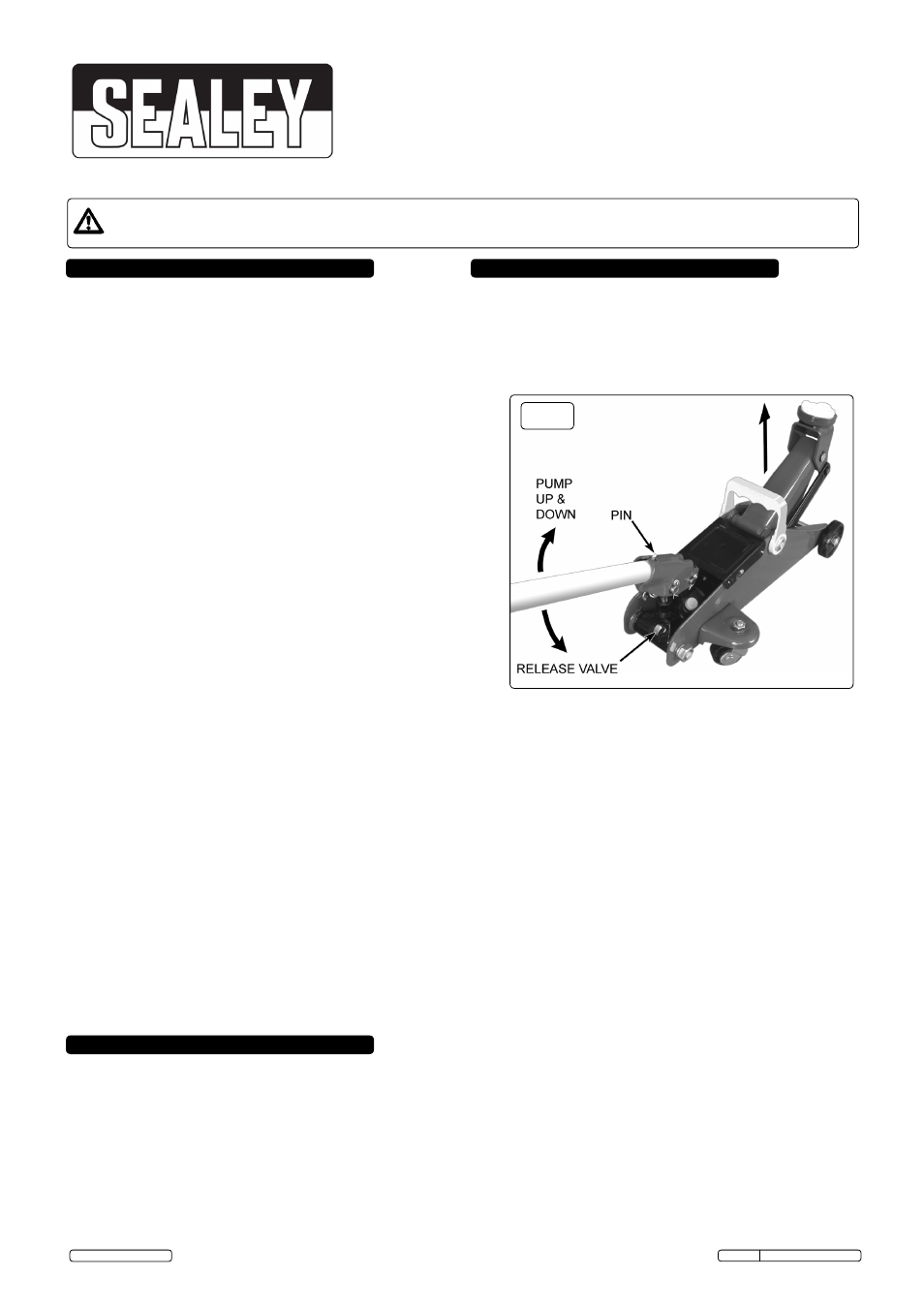Sealey 1015CX User Manual
1015cx, Trolley jack, Instructions for

2.1. To pump, place the handle into the jacking socket and turn it to
engage the external pin as shown in fig.1.
2.2. To operate the release valve engage the cross pin in the open
end of the handle with the slot in the end of the release
valve as shown in fig.2.
2.3 Capacity .......................................................................1.5tonne
Min. saddle height ..........................................................130mm
Max. saddle height .........................................................300mm
Chassis height ................................................................133mm
Length ............................................................................415mm
Weight ..................................................................................7kg
InsTruCTIons for:
trolley jack
MoDeL no:
1015cx
Your new Jack is produced and manufactured to a high standard of dependability and will, if used according to these instructions and properly
maintained, give you years of trouble free performance.
Important: read these instructions carefully. note the safe oPerational reQuireMents, WarninGs and cautions.
use this jack correctly and With care for the PurPose for Which it is intended. failure to do so May cause daMaGe
and/or Personal injury and Will invalidate the Warranty. retain these instructions for future use.
1. safety Precautions
2. asseMBly & sPecification
3.1.2. Place a few drops of hydraulic jack oil onto the pump piston
and pump the handle several times to distribute the oil.
Thoroughly lubricate all moving parts.
3.2. General jacking.
p
WArnInG! Before lifting ensure section 1 safety instructions
are read and understood.
3.2.1. Prepare the vehicle as mentioned in the safety instructions
ensuring the ground on which the jack is to stand is level and
solid (not tarmacadam).
3.2.2. Position the jack saddle under the vehicle manufacturer’s
recommended lifting point.
3.3. jacking the vehicle.
3.3.1. Close the release valve using the handle as shown in fig.2.
Place the handle into the handle socket and commence
pumping handle up and down using maximum strokes until the
jack saddle reaches the vehicle jacking point. Check the
jacking point is centrally located on the saddle and raise the
vehicle.
3.3.2. should the jack become overloaded, a safety excess pressure
valve will open, and stop the vehicle from lifting.
p
WArnInG! The jack is a lifting device only and must not be
used to support the load. use correctly rated axle stands to
support the load. When lifting a load of maximum capacity
(1.5tonne) or close to it, it is recommended that the effort be
reduced by the use of assistance during this operation.
3.4. lowering the vehicle
p
WArnInG! ensure there are no persons or obstacles beneath
the vehicle, or in the path of its descent.
3.4.1. If using axle stands, raise the jack high enough for the stands
to be easily removed. Then place the handle onto the release
valve nut and turn anti-clockwise, very slowly, to open the valve.
3.4.2. The lowering speed is controlled by the amount you turn the
handle. Lower carefully, avoid any sudden changes in descent
rate which would shock load the hydraulic system.
3. oPeratinG instructions
3
ensure the jack is in sound condition and good working order.
Take action for immediate repair or replacement of damaged
parts. use genuine parts only. The use of unapproved parts
may be dangerous and will invalidate the warranty.
3
Locate the jack in a suitable, well lit working area.
3
Keep working area clean and tidy and free from unrelated
materials.
3
use jack on level and solid ground, preferably concrete. Avoid
tarmacadam as jack may sink in.
3
Place wedges under wheels of vehicle (but ensure wheels of
jack can freely move).
3
ensure the vehicle handbrake is engaged, engine is switched
off and transmission is in gear (or “PArK” if automatic).
3
ensure minimum distance of 0.5m between vehicle and static
objects such as doors, walls, etc., to allow for vehicle tilting.
3
ensure there are no passengers in the vehicle.
3
ensure all non-essential persons keep a safe distance whilst
the jack is in use.
3
only place jack under those lifting points recommended by
vehicle manufacturer (see vehicle hand book).
3
Check the lifting point is stable and centred on the jack saddle.
3
ensure the jack wheels are free to move and that there are no
obstructions.
p
danGer: use the jack for lifting only, not for supporting the
lifted load.
3
use suitable capacity axle stands under the vehicle before
proceeding with any task.
3
ensure there are no persons or obstructions beneath the
vehicle before lowering.
3
use a qualified person to maintain or repair the jack hydraulic
system.
7
do not operate the jack if damaged.
7
do not allow untrained persons to operate the jack.
7
do not exceed the rated capacity of the jack (1.5tonne).
When lifting a load of maximum capacity or close to it, it is
recommended that the effort be reduced by the use of
assistance during this operation.
7
do not allow the vehicle to move while supported by the
jack, or use the jack to move the vehicle.
7
do not jack vehicle if there is a risk of spillage of fuel, battery
acid, or other dangerous substances.
7
do not work under the vehicle until axle stands have been
correctly positioned.
7
do not use the jack for purposes other than which it is intended.
7
do not top up hydraulic system with brake fluid. use
hydraulic jack oil only.
7
do not adjust the safety overload valve.
7
When not in use store jack, fully lowered, in a safe, dry,
childproof area.
3.1. Before first use.
3.1.1. Before using jack, purge hydraulic unit in order to eliminate any
air in the system. Place handle onto the release valve nut
as shown in fig.2 and open the valve by turning the handle
anti-clockwise, place the handle back into the jacking socket
and pump for 30 to 40 seconds. see fig.1 When complete,
close the release valve by turning the valve nut clockwise.
fig.1
Original Language Version
1015CX Issue: 2(I) - 05/03/14
© Jack sealey Limited